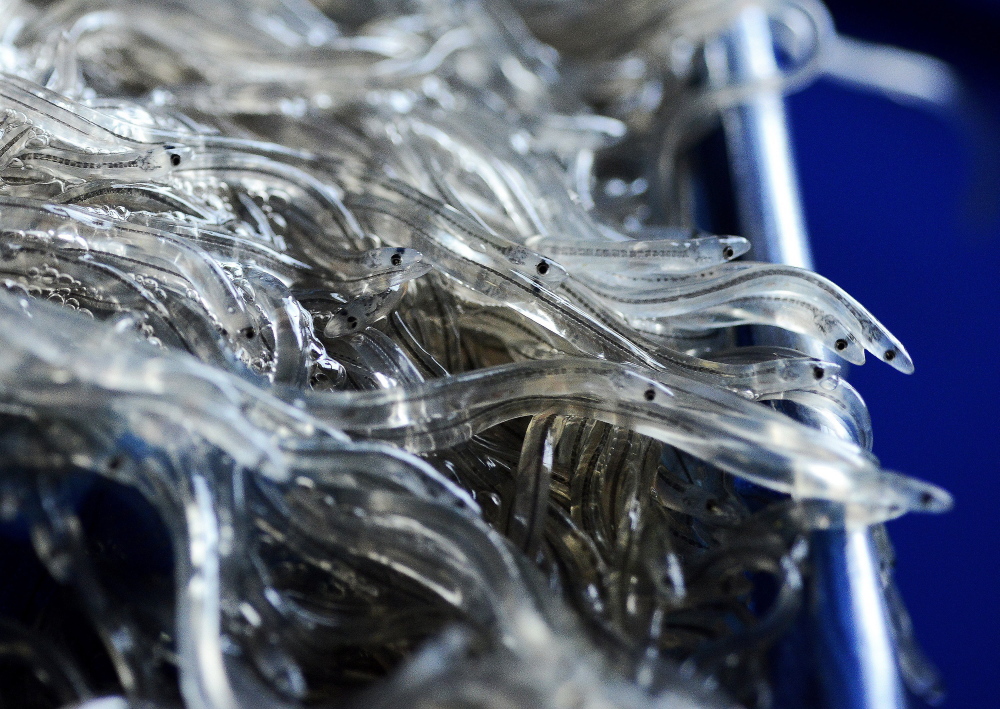Federal regulators Monday voted to impose stronger restrictions on the elver harvest for the next three years in Maine, and also to keep the newly established quota system.
Fishermen say they’re frustrated by the decision but at the same time relieved that the limit is not as harsh as it could have been.
The decision affects the livelihoods of the hundreds of people working in the fishery, which has recently been the second-most valuable fishery in the state, behind only lobsters. This spring, the catch had an estimated value of $8.4 million.
The American Eel Management Board, meeting in Mystic, Connecticut, voted 12-2 to approve the new harvest quota of 9,688 pounds. Once that quota is reached, the entire fishery must shut down.
The quota for the 2015-2017 seasons is based on the amount of elvers fishermen caught last spring, a season that was slow to start because of the extended winter and cool weather. Last season’s 11,749-pound quota was not reached by the time the season ended on May 31. It was the first time fishermen fished under a statewide quota.
Although more than 900 people in Maine have permits to catch elvers, about 500 of them catch only about 3 pounds a year, said Jeffrey Pierce, director of the Maine Elver Fishermen’s Association. He said many permit holders are reluctant to give up their permits, even though they no longer have the stamina or interest to fish all night. Fishermen use lights at night to attract elvers into their dip nets.
The lower quota will primarily hit a smaller group of young, harder-working fishermen who catch most of the elvers in the state, he said.
“The young go-getters who are doing well are going to take more of the hit,” Pierce said.
The three-year quota will provide the fishery with some much-needed stability, he said.
Elver stocks are “depleted” based on the reduction in landings and the downward trend in many surveys along the East Coast, said Kate Taylor, the commission’s senior fisheries management plan coordinator.
Pat Keliher, commissioner of the Maine Department of Marine Resources, said he had advocated that the board keep last season’s quota of 11,749 pounds. He noted that the department for the first time allocated swipe cards to each fisherman to track sales to dealers, a move that successfully reduced poaching.
Still, the new quota is much better than the 5,000-pound quota that was proposed by a technical committee, he said.
MAINE LANDINGS
Elvers, also known as glass eels, are juvenile eels that are born in the Sargasso Sea, south of Bermuda. Each spring, they migrate to rivers in North America, where they spend their adult lives before returning to sea after reaching maturity.
Ninety-eight percent of elver landings in the United States occur in Maine. The elvers, tiny specimens some 2 to 3 inches long, are shipped to Asia and then raised to adulthood in aquaculture operations.
The only other state with an elver fishery is South Carolina, with 10 permits. That fishery is regulated separately.
The price for elvers peaked in 2013, with dealers paying from $1,800 to $2,000 a pound. Prices this year fell to between $400 and $650 per pound. A preliminary state audit shows that dealers this spring paid out $8.4 million – a quarter of what was paid for elvers in 2013.
That year, lobster harvesters received $378 million, elver harvesters $32.9 million and soft-shell clam harvesters $16.9 million.
“As long as the price stays up, the economic value to the state of Maine is tremendously high,” Keliher said.
Send questions/comments to the editors.



Success. Please wait for the page to reload. If the page does not reload within 5 seconds, please refresh the page.
Enter your email and password to access comments.
Hi, to comment on stories you must . This profile is in addition to your subscription and website login.
Already have a commenting profile? .
Invalid username/password.
Please check your email to confirm and complete your registration.
Only subscribers are eligible to post comments. Please subscribe or login first for digital access. Here’s why.
Use the form below to reset your password. When you've submitted your account email, we will send an email with a reset code.